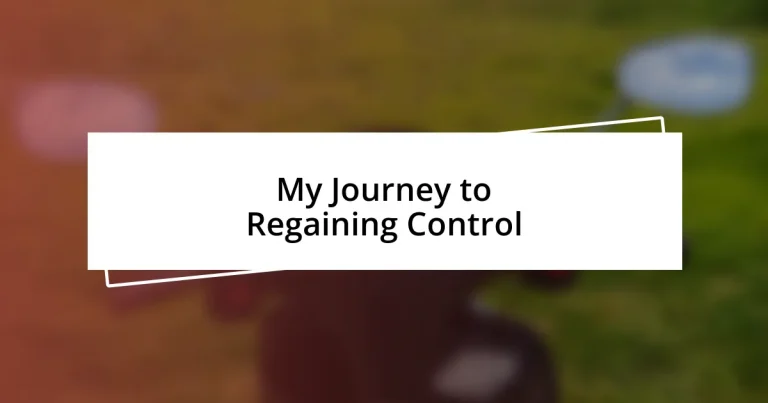Key takeaways:
- Personal control involves recognizing what we can influence versus what we cannot, leading to more effective energy management.
- Setting specific control goals, such as reducing screen time, empowers individuals to reclaim their time and focus.
- Daily routines and mindful practices, like journaling and mindfulness, significantly enhance emotional regulation and a sense of control.
- Celebrating small achievements fosters motivation and shifts mindset towards positivity, encouraging continued growth and progress.
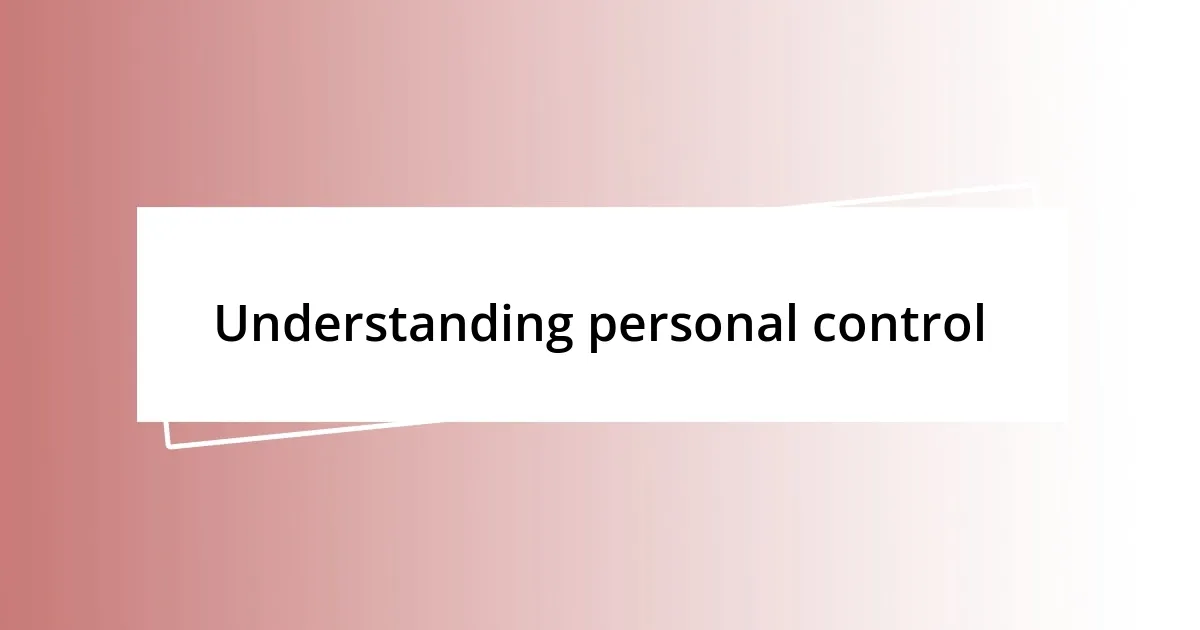
Understanding personal control
Personal control is more than just a concept; it’s a feeling that can deeply impact our daily experiences. I remember a time when I felt overwhelmed by external circumstances, constantly reacting rather than acting. It made me wonder, how often do we let life dictate our choices instead of claiming that power ourselves?
As I navigated my journey, I realized that understanding personal control requires recognizing the distinction between what we can influence and what we cannot. In moments of frustration, I learned to ask myself: “Am I focusing on things I can change, or am I wasting energy on the unpredictable?” This shift in mindset transformed my approach, allowing me to prioritize my energy effectively.
Also, the emotional weight of personal control can be profound. I still recall the liberation I felt when I started setting boundaries in my relationships. This simple act of asserting my needs helped me reclaim my autonomy and underscored that genuine control often begins within, leading to a more balanced and fulfilling life. How many times do we overlook our own needs while trying to please others? It’s a question that pushed me to reassess my priorities and take charge of my own happiness.
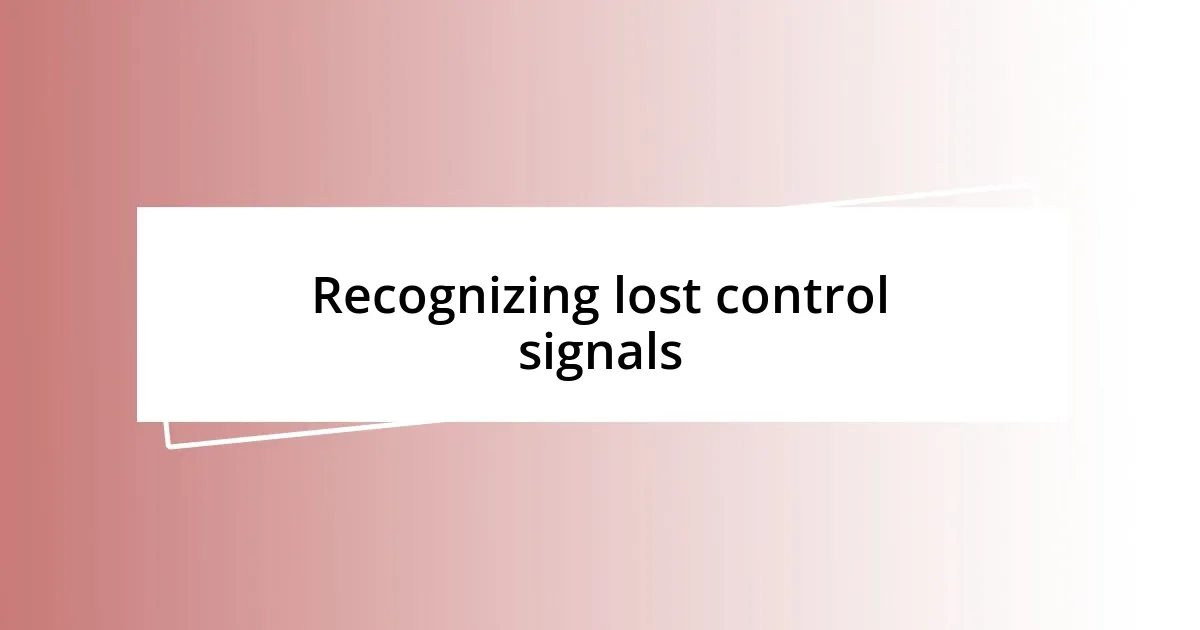
Recognizing lost control signals
Recognizing the signals that indicate we’ve lost control can be incredibly liberating. For me, it often manifested as a sense of constant anxiety—waking up each day with a pit in my stomach, overwhelmed by tasks that seemed insurmountable. Have you ever found yourself in a similar situation, where even the simplest decisions felt exhausting? This internal chaos can be a clear signal of losing grip on what’s truly in our control.
Another critical signal is feeling reactive rather than proactive. I remember a time when I would let external events dictate my mood, completely at the mercy of other people’s actions. It struck me how often I let others’ opinions overshadow my own sense of direction. Recognizing that feeling of being swept away by life’s currents helped me understand that I needed to make deliberate choices, focusing on what I could influence rather than what I couldn’t.
Moreover, physical signs often accompany these emotional states. I started noticing patterns in my body language: tense shoulders, clenched fists, even jaw pain. Each of these physical manifestations echoed a deeper emotional turmoil. How does your body respond when you feel you’ve lost control? Recognizing these signals allowed me to take a step back, assess my situation, and consciously decide to regain my footing.
| Lost Control Signals | Personal Experience |
|---|---|
| Anxiety | Feeling overwhelmed by daily tasks. |
| Reactivity | Letting external events dictate my mood. |
| Physical Symptoms | Tension in my body as a sign of emotional imbalance. |
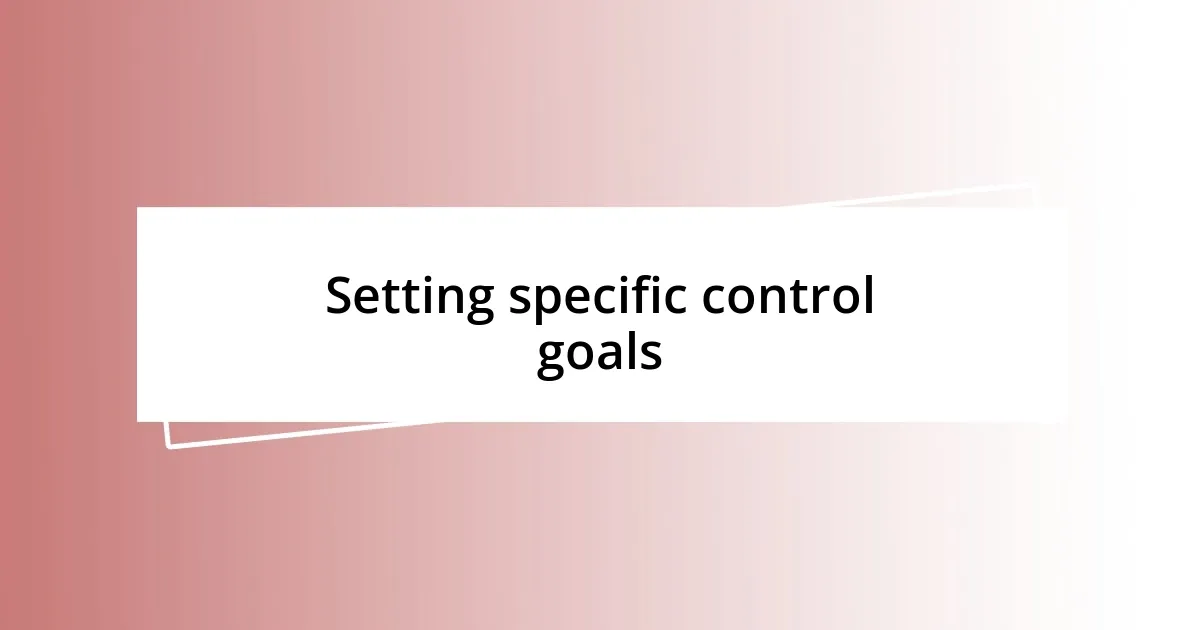
Setting specific control goals
Setting specific control goals has been a game changer for me. It’s not enough to say you want to feel more in control; you have to pinpoint what that means for your daily life. I remember deciding to reduce my screen time because I realized it was affecting my mental clarity and focus. By setting a clear goal of limiting social media use to just 30 minutes a day, I felt empowered to reclaim my time and energy.
Here’s how I break it down effectively:
– Identify Key Areas: Determine which aspects of your life feel out of control—work, relationships, personal time?
– Set Measurable Goals: Instead of vague aspirations, craft specific benchmarks, such as “I will read for 20 minutes before bed.”
– Establish a Timeline: Give yourself a timeframe to achieve these goals. For instance, committing to my 30-minute social media limit for a month helped me track progress.
– Review and Adjust: Regularly assess your goals. I found that weekly reflections on my progress kept me accountable and motivated to adjust if needed.
By focusing on these actionable steps, I’ve noticed a gradual return of my sense of agency. I realized that taking charge doesn’t mean being perfect; it means being deliberate in my choices and mindful of how they align with my personal values.
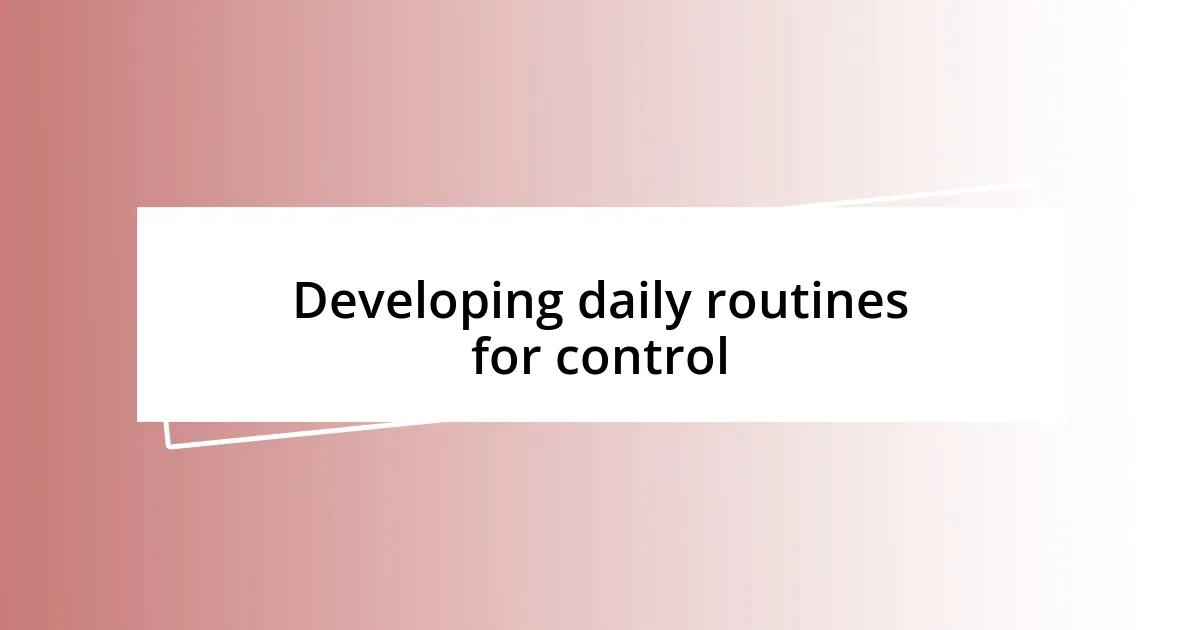
Developing daily routines for control
Setting up daily routines can drastically shift how I perceive control in my life. I found that starting my mornings with a structured routine not only sets a positive tone for the day but also fosters a sense of accomplishment. For example, I carve out 30 minutes each morning for journaling and stretching. How often do you prioritize self-reflection in your day? This simple act helps me feel grounded and engaged with my thoughts, providing clarity on what truly matters.
Creating a consistent nighttime routine has also been pivotal. I remember nights when scrolling through my phone kept me awake, leading to groggy mornings. Now, I switch off all screens an hour before bed, opting for a good book instead. This deliberate action has brought a sense of closure to my day, allowing me to unwind and recharge. Have you ever noticed how much sleep quality improves with just one small change?
Additionally, I’ve embraced the power of scheduling. I allocate specific time slots for tasks, treating them like appointments that can’t be missed. Whether it’s a workout session or a quiet hour dedicated to hobbies, keeping my calendar clear and consistent empowers me to maintain control over my commitments. Isn’t it fascinating how structure can create freedom in our days? Through these routines, I’ve come to understand that feeling in control is often about the small choices we make consistently.
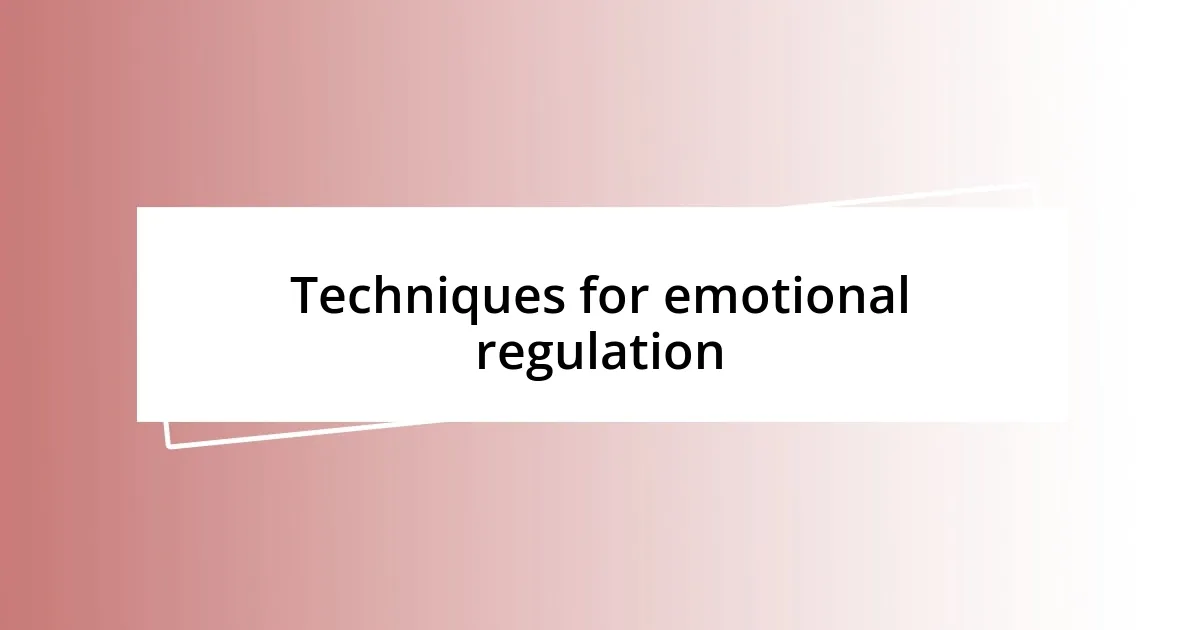
Techniques for emotional regulation
Practicing mindfulness has played a significant role in my emotional regulation journey. During stressful moments, I consciously take a few deep breaths to ground myself, and I can’t help but notice how this simple act brings me back into the present. Have you ever tried to just focus on your breath amidst chaos? It’s remarkable how such a small shift can reset my mindset and reduce the overwhelm I often feel.
I also incorporate the technique of journaling, specifically when I notice my emotions escalating. There’s something cathartic about putting pen to paper; it’s like my emotions spill out and settle into clarity. Last week, I felt a wave of anxiety wash over me while prepping for a presentation. Instead of acting on those jitters, I took 10 minutes to write about my feelings. By the end, I realized that the fear stemmed from perfectionism, which empowered me to simply focus on doing my best instead.
Another technique I embrace is visualization. When I’m facing challenging situations, I vividly imagine a positive outcome. Recently, I had to tackle some difficult conversations with colleagues. Before each talk, I spent a minute picturing us finding common ground and leaving the discussion with mutual understanding. It’s interesting how this mental rehearsal builds not only my confidence but also helps manage the emotional rollercoaster that often accompanies tense interactions. Have you considered how the power of visualization could transform your approach to stress?

Building a supportive environment
Surrounding myself with the right people has been a game changer in my journey to regain control. I remember the moment I realized the impact of my social circle; a gathering with supportive friends lingers in my mind. Their encouraging words and shared experiences provided a comforting backdrop during a challenging time. Have you ever felt that sense of relief simply by being with people who truly understand you?
Finding my tribe meant being intentional about relationships. I made a conscious effort to connect with individuals who uplift and inspire me, even if it meant distancing myself from those who were more toxic. I’ve learned that a supportive environment isn’t just about having friends; it’s about nurturing connections that encourage growth and resilience. Doesn’t it feel impactful to have people who believe in you, especially when you doubt yourself?
Creating a physical space that promotes positivity is equally important. I transformed my home workspace to reflect a vibe that energizes me—the colors, plants, and even the organization of my desk play crucial roles in shaping how I feel. I’ve noticed that when I walk into a tidy, inviting environment, my mood lifts instantly. Have you considered how your surroundings influence your mindset? A small tweak in your space could spark a significant shift in your daily outlook.
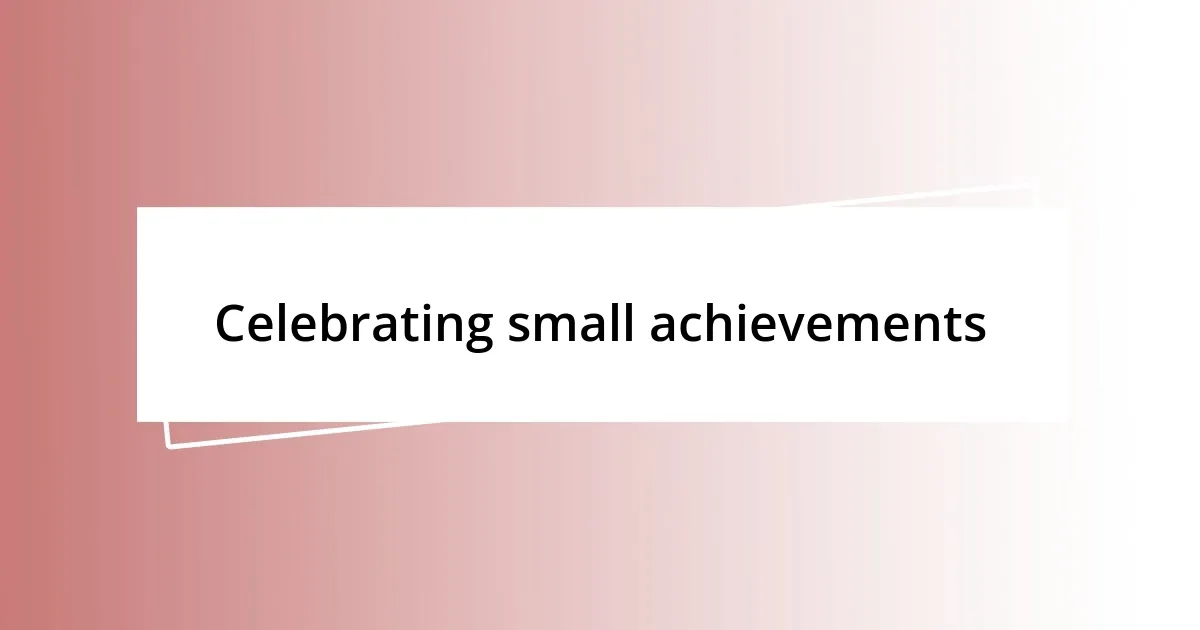
Celebrating small achievements
As I reflect on my journey, I realize that celebrating small achievements has genuinely fed my motivation. One afternoon, I completed a task I had been dreading for weeks, and instead of brushing past it, I took a moment to acknowledge my effort. I treated myself to a cozy evening with a good book, and that little celebration felt like planting seeds of encouragement in my own garden of growth. Have you ever paused to appreciate the small steps you’ve taken towards your goals? It truly makes a difference.
It’s fascinating how acknowledging even the tiniest victories can boost one’s spirit. Just last month, I set a goal to meditate for five minutes daily, and after a week, I found myself not just meeting but exceeding that. I didn’t simply move on; I decided to mark this achievement with a small ritual—lighting a candle and reveling in the tranquility it brought. This practice not only reinforced the habit but also created a sense of accomplishment that was both grounding and uplifting. Can you remember a moment when you celebrated a small win and felt an unexpected wave of joy? Those moments matter.
In my experience, celebrating small achievements often leads to a cascade of positivity. There was a time when I struggled to stay consistent with my workouts, but after hitting a two-week streak, I indulged in a fun workout playlist as a reward. I noticed that this simple act transformed my mindset; I stopped seeing exercise as a chore and began to view it as something to look forward to. What if you embraced your small wins too? They could pave the way for substantial change and rejuvenate your journey toward regaining control.












